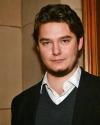The UW Composition program presents a year-end concert of works by student composers.
Program
The Chicken Wars — Alex Ryan
for voice, viola, bassoon, and piano
Alex Ryan, voice
Abigail Schidler, viola
Griffin Smith, bassoon
Kaisho Barnhill, piano
Memory — Taylor James Bellamy
for fixed media
The Four Guardians — Elly Lee
for voice, tuba, cello, and double bass
Elly Lee, voice
Foster Patterson, tuba
Serena Tideman, cello
Eddie Nikishina, double bass
Café concret — Ryan Baker
for fixed media
In the Garden Suite — Serena Tideman
for flute, tuba, percussion, harp, piano, cello, double bass, and electronics
I. Nightingales
II. Interlude
III. Sunday Morning
Rachel Reyes, flute
Cole Henslee, tuba
Foster Patterson, tuba
Melissa Wang, percussion
Kelly Guangyin Hou, harp
Chiao-Yu Wu, piano
Serena Tideman, cello
Eddie Nikishina, double bass
Elly Lee, electronics
INTERMISSION
From Silence to Quiet — Eddie Nikishina
for voice, tuba, cello, and double bass
Elly Lee, voice
Foster Patterson, tuba
Serena Tideman, cello
Eddie Nikishina, double bass
Samenstück (excerpts) — Justin Zeitlinger
for fixed media
398112639.wav
278326434.wav
283485835.wav
The Tiger and the Gotgam — Foster Patterson
for voice, tuba, cello, and double bass
Elly Lee, voice
Foster Patterson, tuba
Serena Tideman, cello
Eddie Nikishina, double bass
What's it like to be you? — Sophie Ma
for fixed media
Into the Blue — Ryan Rose
for voice, violin, double bass, percussion, and piano
Sophie Ma, voice
Justin Zeitlinger, violin
Eddie Nikishina, double bass
Ryan Baker, Melissa Wang, percussion
Kaisho Barnhill, piano
Program Notes
The Chicken Wars - Alex Ryan
This piece is a study of the melody and harmony underlying narrative oration. Pitches were drawn from a recording of this monologue and harmonies were derived from those pitches. In many cases, the subjective assignment of pitch to a given syllable changed on different listenings, and in those cases intervals were assigned, which further clarified harmonies. The piece is intended as a collaborative storytelling effort meant to highlight the musicality of speech.
The Four Guardians - Elly Lee
Over a distant mountain, there’s a golden land where honey flows
Over the brilliant sky, the four guardians dance
At sunrise on a warm spring day, across the green forest
At noon in the hot summer, through the red flames
At sunset on a cool autumn day, through a field filled with white iron
At midnight in the cold winter, crossing the black sea
The image of the sky leads to the earth,
Guardians of the universe, lead us to the right way
Ah, the four symbols shine brightly
Retreat, as darkness and chaos won't stop us
Ah, nature and man have become one
Praise, as balance and harmony will last forever
At dawn, a blue dragon flies to the east
At midday, a red bird glides to the south
At dusk, a white tiger runs to the west
At midnight, a black turtle crawls to the north
The image of the sky leads to the earth,
Guardians of the universe, lead us to the right way
Ah, the four symbols shine brightly
Retreat, as darkness and chaos won't stop us
Ah, nature and man have become one
Praise, as balance and harmony will last forever
Ah, four gods are looking over us
Make way, not even time and space can stop them
Ah, the sky and the earth are united
Forever, continuing reincarnation and peace
Ah, the four symbols shine brightly
Retreat, as darkness and chaos won't stop us
Ah, nature and man have become one
Praise, as balance and harmony will last forever
In the Garden Suite - Serena Tideman
In the Garden Suite is inspired by nightingales, both those of Beatrice Harrison’s garden
and the one of the fairy tale by Hans Christian Anderson, and also the nightingales in
Berlin that improvisers serenade. Beatrice Harrison was the “favorite cellist” of Edward
Elgar, and made the first recording of the Elgar Cello Concerto with the composer
conducting. She also made a popular weekly BBC broadcast playing cello with birds in her
garden until WWII bombing forced the radio show to go silent. In the Nightingale fairytale,
the Emperor covets the beautiful singing nightingale and has it brought from the palace
gardens to a golden cage inside the palace. Then someone gives him the gift of a
mechanical nightingale, and he forgets about the real nightingale. After his mechanical
nightingale breaks, he is heartbroken and on his deathbed. The real nightingale, free of its
cage, attempts to serenade him one last time before returning to the garden. The piece
utilizes elements of “musique concrete” and field recordings of birds, including an archival
recording from Beatrice Harrison’s garden, as well as some stylistic influence from Elgar’s
elegiac melancholy and a “mechanical bird” made from a “beepbox” loop. Visualizing
lush gardens and also the death of gardens, to be replaced 100 years later with buildings,
and then in certain places, the wildness regains tractions. “Compose for your friends”
recommends Nico Muhly. For “In the Garden Suite” I have tried to compose for my friends,
and for the heroic ghosts of yesteryear. Even if at times it is melancholy, it also has
moments of peace and mirth.
From Silence to Quiet - Eddie Nikishina
Through the gradual building of a melody and revoicing of harmonies, From Silence to Quiet follows the changing perspectives of a person seeking to understand and accept an aspect of their identity. Unknowing Always, always on the brink of words Silence blares, refusing Wordless din, chilling conclusion Why? Disapprove of this, without knowing why Reasons indistinct become true Why this? To stand and watch trials of once carefree mirrors Is to be grateful Grateful to fear Unsettled Halting Silent Still Longing to soften from silence to quiet Unseen by contention, unmoved by warmth
Samenstück - Justin Zeitlinger
I am presenting here a few of the individual audio tracks that make up my installation piece
Samenstück (for five hanging cassette players), which was shown at the UW Biology Greenhouse as part of the exhibition An uncanny garden on May 22–24, 2024. Below is the description that accompanied
the installation:
Samenstück is a sound installation consisting of five independent 45-minute cassette tapes. Each one employs granular and concatenative synthesis techniques from samples of classical music that invoke or depict plant life, in various “ripe” (heavily altered) / “unripe” (quotation) and “seed” (chopped) / “plant” (linear) forms. The cassette tapes and the music they play comment on the relationship between analog technology and nature, as well as uncover the web of themes that these classical works import in their associations with nature: love, longing, God, alienation, human folly. Additional decorative strands of cassette tape visually connect the medium of the sound with the organic plant bodies.
As the tapes run out, each one must be manually rewinded, causing the “channels” to fall out of sync and an irreproducibly-evolving soundscape to emerge over time.
For this concert version, the tracks are played as individual sound-objects—one at a time—to offer an alternative (and perhaps more focused) perspective from the soundscape inside the greenhouse.
The Tiger and the Gotgam - Foster Patterson
This setting of the Korean folk story, “The Tiger and the Gotgam” (also known as “The Rabbit’s Tail”) for chamber ensemble and narrator revolves around the cultural and musical function of the minor third. From the symmetry of the diminished seventh chord, to the depiction of children in music, to its cadential function in the south-western Korean styles Sanjo and Pansori, to the many calls, taunts, and cheers that have developed throughout history and across different cultures, this piece aims to wring this interval of all its implicative juices and then further twist it into evocative shapes with the help of rhythmic patterns(Jangdan) from the Sanjo and Pansori traditions. I hope you enjoy this story of mischief and misunderstandings, and of course, watch out for the Gotgam.
Into the Blue - Ryan Rose
The ocean, sometimes referred to as the blue, can be very calming with its oscillating waves and its great, everchanging stasis. At the same time, the deep waters hold great mysteries and can seem very dangerous. The phrase out of the blue is used to depict how something happened to you unexpectedly. Inversely, into the blue could mean that you willingly dive into the unknown, facing the potential scare directly. At times, one may find themselves stuck in the stasis of the everyday, waiting for life to act on them, but choosing to take the risks of action leads to a meaningful life. Rather than waiting for life to happen, jump into the blue and see what it holds.
Director Biographies

Huck Hodge is professor and chair of the composition program in the school of music. A composer of “harmonically fresh work", "full of both sparkle and thunder” (New York Times), his music has been praised for its “immediate impact” (Chicago Tribune), its "clever, attractive, streamlined" qualities (NRC Handelsblad, Amsterdam), and its ability to "conjure up worlds of musical magic” with “power and charisma" (Gramophone Magazine, London). There is a dramatic interplay of color, light, and darkness in his music, which emerges from an uncanny blending of pure and dissonant harmonies, widely spaced orchestrations and vast, diffuse timbres.
Hodge is the recipient of many prestigious awards and distinctions. Among these is the Charles Ives Living, the largest music award conferred by the American Academy of Arts and Letters. His other major awards include the Rome Prize (Luciano Berio Fellowship), the Gaudeamus Prize, a Guggenheim Fellowship, commissions from the Koussevitzky Foundation in the Library of Congress, the Fromm Foundation at Harvard University, the American Composers Forum (JFund), the Barlow Endowment, Music at the Anthology (MATA), the American Academy in Rome, Muziek Centrum Nederland, Musik der Jahrhunderte, and the National Theater and Concert Hall of Taiwan, in addition to multiple grants and awards from ASCAP, the Bogliasco Foundation, Copland House, the Deutscher Akademischer Austauschdienst (DAAD), MacDowell, New Music USA, the Siemens Musikstiftung, and Yaddo.
His music has been performed at Carnegie Hall, Lincoln Center and at numerous major festivals — the New York Philharmonic Biennial, Berliner Festspiele, Gaudeamus Muziekweek, Shanghai New Music Week (上海当代音乐周), ISCM World Music Days, and many others in over twenty countries on six continents. Other performances include those by members of the Berlin Philharmonic and Ensemble Modern, the ASKO / Schönberg Ensemble, the Seattle Symphony, and the Orchestra of the League of Composers. His chamber music has been premiered, performed and recorded by a long list of soloists and ensembles such as the Daedalus, JACK, Mivos, and Pacifica string quartets, the Adapter, Aleph, Argento, Dal Niente, Divertimento, Insomnio, SurPlus, and Talea ensembles, and his colleagues David Gordon, Donna Shin, Cristina Valdés, Cuong Vu, and Bonnie Whiting. His published music is distributed by Alexander Street Press (US) and Babel Scores (France). Recordings of his music appear on the New World and Albany record labels and have been featured in numerous national and international broadcasts.
Before joining the University of Washington, Hodge taught composition at Columbia University, where he earned his M.A. and D.M.A. studying with Fred Lerdahl, George Lewis, and Tristan Murail. Prior to this, he studied composition, theory, and new media at the Staatliche Hochschule für Musik und Darstellende Kunst in Stuttgart, Germany, with Marco Stroppa and Georg Wötzer as well as music, German literature and philosophy at the University of Oregon and the Universität Stuttgart. He has been a visiting professor/invited lecturer on music and aesthetics at a variety of institutions including the University of Chicago, CNMAT/UC Berkeley, UCSD, Columbia University, Eastman School of Music, Manhattan School of Music, NYU, and the Universität der Künste in Berlin, and he served for three years as the director of the Merriman Family Young Composers Workshop at the Seattle Symphony.

Yiğit Kolat’s music explores the liminal frontiers of musical activity and potentialities in processing extra-musical data as musical information. The complicated political and social environment of his native Turkey is a recurring theme in his diverse output, which includes acoustic, electro-acoustic, and electronic works written for orchestra, chamber ensembles, voice, and solo instruments.
His works, described as “touching and convincing...a multi-sensory universe,” (K. Saariaho) have been recognized by a prestigious array of international organizations, including the Bogliasco Foundation (2016 Edward T. Cone Bogliasco Fellow in Music), the Tōru Takemitsu Composition Award (1st Prize, 2015), the Queen Elisabeth Competition in Belgium (Finalist, 2013), and the Concours International de Composition Henri Dutilleux (2nd Prize, 2012).
His music has been featured throughout the United States, Europe, and Asia by leading ensembles and soloists, among them the Tokyo Philharmonic and Ryoko Aoki (Japan); Solistes de L’Orchestre de Tours, Donatienne Michel-Dansac, and Pascal Gallois (France); The Nieuw Ensemble, The Black Pencil Ensemble, and the Duo Mares (The Netherlands); Eric Wubbels, Jonathan Shames, the Talea Ensemble, and the Argento New Music Project (USA); the Presidential Symphony Orchestra of Turkey; Peter Sheppard-Skaerved and Aaron Shorr (Great Britain). His music has been broadcast by the Japan Broadcasting Corporation (NHK) and Turkish Radio Television (TRT).
Kolat earned his Doctorate of Musical Arts at the University of Washington, studying with Joël-François Durand.
